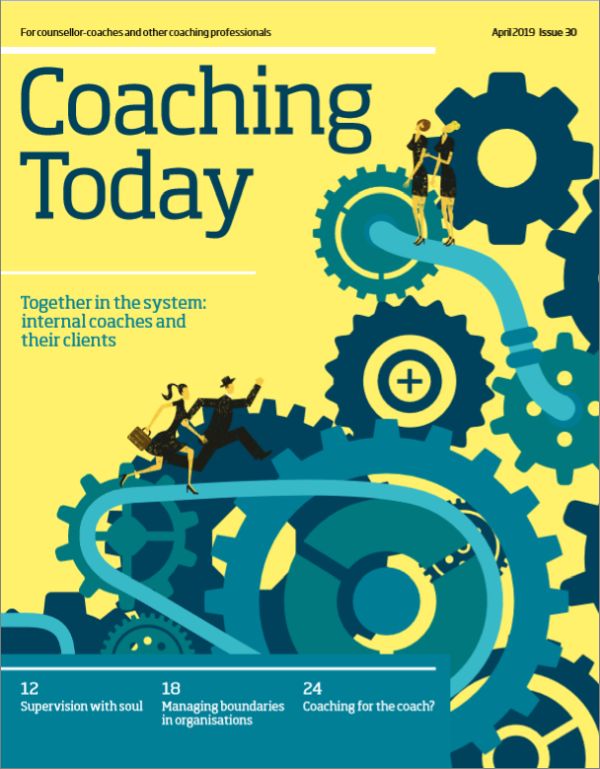In this issue
Features
Thinking together: the untapped potential of internal coaches (Free article)
Bill Critchley and Ann Knights
Soul power in supervision: self, practice and collective evolution
Caroline Jesper
Here and now, this space between us: managing boundaries
Tim Jones and Catherine Noel
Crab to dolphin: experiments in Gestalt
Nick Wright
Regulars
Meet the member
Tracy Cooper

Divisional members and subscribers can download a pdf of this issue from the Coaching Today archive.
Editorial
Boundaries. What are they for and what do they do? Geographical boundaries, professional boundaries, physical boundaries, personal boundaries – dividing one region from another, delineating one role from another, separating me from you, or a perceived aspect of myself from another. What do boundaries look like or feel like? And how do we know when a boundary has been crossed?
Some boundaries are hard, like a brick wall; some more flexible and permeable, like a sheet of stretchy Lycra; some fragile, like a soap bubble that easily pops; and some are practically invisible and appear non-existent until crossed, when a wire fence magically appears from nowhere and we find ourselves impaled and bleeding on it, wondering what the hell just happened...
Of course, the concept of navigating, communicating and maintaining boundaries is familiar to anyone working in a relational or helping role, but they have been on my mind a lot just lately, not least due to the current political climate of uncertainty. At the time of writing this column (early March), I still have no idea if we in Britain will leave the European Union as scheduled on 29 March, with or without a deal. In addition, the political landscape has been dominated this past month with news of members of our two main political parties breaking away to form their own Independent Group, citing frustration and dismay with perceived anti-Semitism and both parties’ handling of Brexit. In the meantime, a 19-year-old woman who left Britain at the age of 15 to join Islamic State in Syria, is in the position of having her British citizenship revoked. I am led to wonder what all of this says about our attitudes towards race, gender, culture and ethnicity, and how much of this current climate of fear, hatred and mistrust is impacting me and my clients – many of whom are women with histories of abuse and violence – and the organisational, social and political context we operate in. I have found myself asking: ‘How much of this do I allow in? How is it affecting me – and how much of myself – and therefore this – do I bring into this relationship?’
While grappling with this boundary, and gathering the contributions for this spring issue, I realised that the common theme emerging from our writers was that of those blessed boundaries and how we engage with them, manage them and utilise them in our work with care, creativity, humility and reflexivity; so that both we ourselves and our working relationships – whether with our clients, coaches, coachees, colleagues, peers, managers, supervisors or supervisees – are enhanced and enriched in the process. What’s also emerging strongly is the importance of being willing to sit in that space of ‘not-knowing’; of being willing to lean in and ask the difficult questions, to admit we don’t have all the answers, and to have the courage to be authentically vulnerable and bring all that we are into these relationships. Whether it is engaging in active co-inquiry as an internal organisational coach, managing the dual role of manager and coach (or counsellor and coach), or finding ways to support our personal and professional development through our own coaching and supervision, the question, as posed by the authors of our cover feature on p6, Thinking Together: ‘How do I bring myself fully into this relationship?’ is ever present. This navigating of the boundary between multiple roles, and between the personal and professional, is a constant dance – a creative process of questioning, which can in itself be transformational at an individual and relational level, and deeply satisfying. As Caroline Jesper writes, on the evolutionary potential of supervision: ‘By learning to sit comfortably with uncertainty, we allow for greater creativity and reflexivity, which opens the door for the soul to come in’.
For now, I am learning to sit with the discomfort of uncertainty and not-knowing, and leaning in to that, while staying open to what emerges in the relationship. I’d love to hear how you too are navigating your own boundaries and relationships with your clients in this current climate, and I hope the contents of this issue resonate with you. Drop me a line and let me know.
Diane Parker
editorial@bacpcoaching.co.uk
